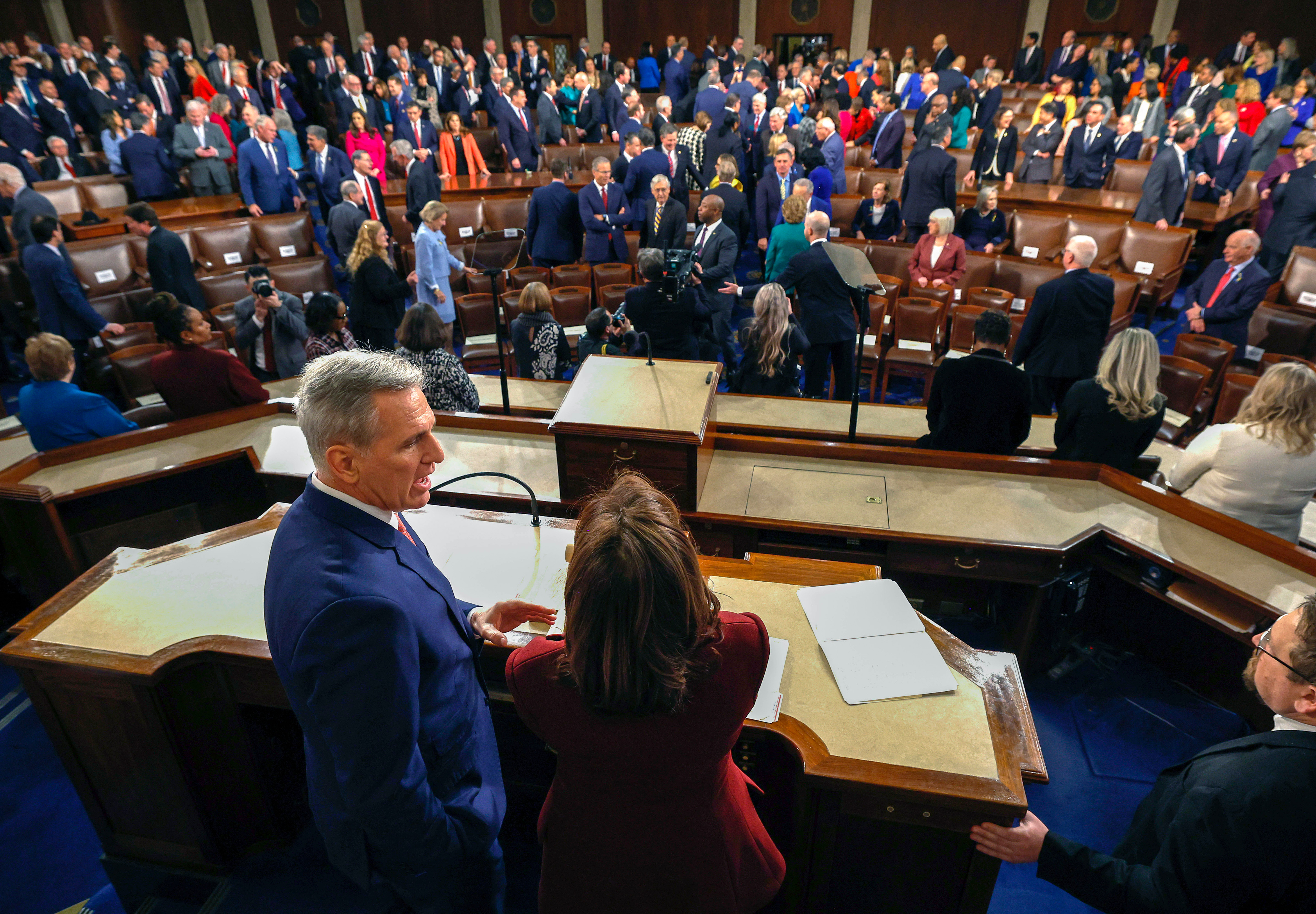The American Families and Jobs Act, a package of three new tax bills proposed by House Republicans, would, among other things, limit many recently enacted green energy tax credits, create a bonus standard deduction for individuals through 2025, and temporarily extend a number of business provisions from the Tax Cuts and Jobs Act (TCJA). These provisions include 100 percent expensing for equipment and research and development (R&D) investments through the end of 2025.
Even though it is unlikely to become law, the combined House GOP tax bill is essentially revenue neutral and demonstrates that members place a high importance on increasing the incentives for businesses to invest in the United States. By making the provisions for company investment cost recovery permanent and paying for it by further restricting business credits and other tax expenditures, the American Families and Jobs Act might be strengthened.
Three TCJA corporate policy changes that went into effect in 2022 or 2023 would be temporarily repealed under the Build It in America Act (H.R. 3938), and their new expiration date would coincide with the larger TCJA individual income tax provisions' expiration at the end of 2025. Companies have to adjust to a five-year R&D expense amortization period starting in 2022 (15 years for R&D cited in foreign countries), as well as a tighter interest deduction cap based on EBIT rather than EBITDA (earnings before interest, tax, depreciation, and amortization). Companies must also prepare for the gradual phaseout of 100% bonus depreciation, which will start this year. The new proposal would apply the policies retroactively as if they had never changed and continue them through the end of 2025. According to Tax Foundation projections, the cost would be $29 billion on a conventional basis (before taking into account effects on economic growth) and $11 billion on a dynamic basis (after taking into account growth) through 2033. Through 2025, revenue is expected to be reduced by around $258 billion, but revenue is expected to increase after that.

The bill would limit the green energy credits provided by the Inflation Reduction Act, including repealing or changing the credits for clean energy investment, clean electricity production, previously owned clean vehicles, clean vehicles, and qualified commercial clean vehicles. The Joint Committee on Taxation (JCT) predicted that the adjustments to green energy credits would result in a total revenue increase of $216 billion between 2023 and 2033.
The Small Business Jobs Act (H.R. 3937) would raise the phaseout threshold from $2.7 million of property to $4.0 million and permanently increase the maximum Section 179 expensing deduction to $2.5 million (from $1.08 million in 2022). The American Rescue Plan Act reduced third-party network transaction reporting requirements, but the IRS put off implementing them. It would also reinstate those rules, raise the 1099 reporting threshold to $5,000, extend the exclusion for qualified small business stock to S corporations, and expand the Opportunity Zones program to rural areas. The JCT calculates that the total cost of the Small Business Jobs Act's provisions would exceed the budget window by nearly $81 billion.
The standard deduction would be temporarily increased by $2,000 for solo filers, $3,000 for head of household filers, and $4,000 for joint filers through 2025 under the Tax Cuts for Working Families Act (H.R. 3936). Above $200,000 for solo filers, $300,000 for head of household filers, and $400,000 for joint filers, the additional amount would phase out by 5%. According to Tax Foundation's projections, the bonus deduction adjustment would decrease revenue by $84 billion dynamically and $94 billion conventionally.
Only four of the tax changes were specifically modeled by us: the extension of 100% bonus depreciation, R&D expensing, the limitation of net interest deduction based on EBITDA, and the temporary bonus standard deduction. In order to account for the items we did not explicitly model, we included JCT ratings. Overall, we find that when scored on a conventional basis, the three legislation would be revenue-neutral from 2023 through 2033, including the retroactive components of the company tax adjustments.
Since tax revenue would decrease by more than $100 billion per year for the next three, the majority of tax cuts would take place in 2023 through 2025. Following that, tax revenue would increase compared to the starting point. Both the reduction of the green energy tax credits and the change in the timing of business deductions for investment are responsible for that rise.
| Provisions (Billions of Dollars) | 2023 | 2024 | 2025 | 2026 | 2027 | 2028 | 2029 | 2030 | 2031 | 2032 | 2033 | Total |
|---|---|---|---|---|---|---|---|---|---|---|---|---|
| Extension of R&D Expensing | -$91.5 | -$12.6 | -$4.7 | $84.7 | $27.9 | $9.5 | $0.0 | $0.0 | $0.0 | $0.0 | $0.0 | $13.4 |
| Extension of 100% Bonus Depreciation | -$16.2 | -$41.2 | -$62.0 | $38.9 | $23.2 | $16.3 | $12.5 | $8.0 | $4.6 | $2.3 | $1.3 | -$12.2 |
| Extension of EBITDA-Based Interest Limitation | -$16.1 | -$7.4 | -$6.7 | $0.0 | $0.0 | $0.0 | $0.0 | $0.0 | $0.0 | $0.0 | $0.0 | -$30.2 |
| Bonus Standard Deduction | $0.0 | -$46.5 | -$47.7 | $0.0 | $0.0 | $0.0 | $0.0 | $0.0 | $0.0 | $0.0 | $0.0 | -$94.2 |
| Conventional Subtotal of Scored Items | -$123.8 | -$107.7 | -$121.0 | $123.6 | $51.1 | $25.9 | $12.5 | $8.0 | $4.6 | $2.3 | $1.3 | -$123.2 |
| Dynamic Subtotal of Scored Items | -$120.7 | -$97.1 | -$106.6 | $123.5 | $51.0 | $25.9 | $12.5 | $8.0 | $4.6 | $2.3 | $1.3 | -$95.3 |
| Subtotal of Non-Scored Items from JCT, Including Repeal of Green Energy Credits, Expansion of Opportunity Zones, and Other Changes | -$1.7 | -$4.1 | -$5.0 | $1.0 | $14.1 | $17.3 | $16.7 | $18.8 | $21.3 | $24.4 | $20.5 | $123.2 |
| Conventional Total | -$125.5 | -$111.8 | -$126.0 | $124.5 | $65.2 | $43.1 | $29.2 | $26.8 | $25.9 | $26.7 | $21.8 | $0.0 |
| Dynamic Total | -$122.5 | -$101.2 | -$111.6 | $124.4 | $65.1 | $43.1 | $29.2 | $26.8 | $25.9 | $26.7 | $21.8 | $27.9 |
|
Source: Tax Foundation General Equilibrium Model, June 2023, and Joint Committee on Taxation. |
||||||||||||
The ephemeral nature of the programs would prevent long-term growth in the economy, wages, or employment. However, while the more benevolent policies are in place, they would slightly enhance growth, increasing economic output by around 0.15 percent in 2024 and 2025 (followed by minor drops in economic output beginning in 2026 until economic output returns to its baseline level). In light of this, and taking into account the economic feedback from the four provisions we analyzed, we predict the total package would boost revenue by around $28 billion above the budget frame.
Although the extension of the standard deduction is intended to provide relief from inflation, it is poorly targeted because it postpones relief until next year and offers low-income households little to no benefit. An individual income tax decrease that would increase the deficit is the incorrect strategy if lawmakers are aiming to lower short-term inflation. It would be easier for lawmakers to directly and permanently limit undesired deductions rather than further raising the floor on itemized deductions by increasing the standard deduction, even if the increased standard deduction would build on the TCJA's attempts to curb itemization.
Because allowing poor cost recovery to take root would result in a substantial increase in the after-tax cost of investment when inflation is strong, the company tax reforms are intended to help strengthen investment incentives. It is crucial to address R&D amortization and the phaseout of bonus depreciation, particularly during a time of rising inflation.
While the temporary extension of full bonus depreciation and R&D expensing is a positive move, firms should always have access to full, immediate expensing. The most cost-effective and pro-growth tax policy adjustment that legislators can prioritize is full and permanent cost recovery; it has a track record of success, whereas location-based incentives like Opportunity Zones are less promising.
It is unproductive to use income to retroactively extend the policies because companies cannot invest additional money in 2022 or the first half of 2023. Retroactive relief is crucial since certain small enterprises are experiencing liquidity issues due to R&D amortization, which also raises taxes on unearned revenue.
Finally, by permanently extending 100% bonus depreciation and R&D expensing, politicians should concentrate on broadly enhancing investment incentives and lowering uncertainty. The Build It in America Act's three primary company tax improvements, if made permanent, would increase labor hours worked by almost 100,000 full-time equivalent jobs and long-run economic production by 0.5 percent, primarily due to permanent 100% bonus depreciation. However, on a dynamic basis, around one-fourth of the cost would be recovered due to improved output and incomes inside the budget window, and, in the long run, revenues would be somewhat above baseline. The government would lose revenue over the 10-year budget window. Temporary shortfalls could be covered by reducing credits and other tax expenditures. Better cost recovery is complimentary to the Federal Reserve's efforts to reduce inflation since it supports business investment, especially on a long-term basis.


























